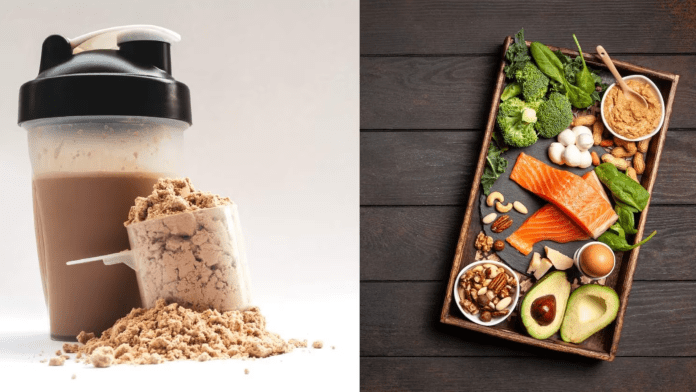When it comes to building muscle, protein is often hailed as the holy grail of nutrients. It plays a crucial role in muscle growth and repair, making it an essential component of any fitness enthusiast’s diet. However, a debate has been brewing among fitness circles: is it better to eat protein or drink it in the form of shakes and supplements? In this article, we will delve into this shocking revelation and uncover the truth behind whether eating or drinking protein can truly transform your muscle gains forever.
Protein Sources
- Animal-Based Proteins
Animal-based proteins, such as lean meats, poultry, fish, eggs, and dairy products, are considered complete protein sources as they contain all essential amino acids. These sources are highly bioavailable, meaning they are easily absorbed and utilized by the body.
- Plant-Based Proteins
Plant-based proteins, such as legumes, tofu, tempeh, quinoa, nuts, and seeds, are also valuable sources of protein. While some plant-based sources may lack certain essential amino acids, consuming a varied diet can ensure all essential amino acids are obtained. Plant-based proteins offer additional benefits like fiber and phytonutrients.
Protein Supplements
Protein supplements provide a convenient and efficient way to meet your protein requirements. They come in various forms, including powders, bars, and ready-to-drink shakes.
- Protein Powders
Protein powders, such as whey, casein, and plant-based options like pea, soy, and rice protein, are widely popular among fitness enthusiasts. They are easy to incorporate into your diet and can be mixed with water, milk, or blended into smoothies.
- Protein Bars
Protein bars offer a portable and on-the-go protein option. They are convenient and often provide a balanced mix of protein, carbohydrates, and fats. However, it’s important to choose bars with high-quality ingredients and minimal added sugars.
- Ready-to-Drink Protein Shakes
Ready-to-drink protein shakes are pre-mixed protein beverages that provide a quick and easy source of protein. They are available in various flavors and can be consumed immediately post-workout or as a snack between meals.
- Protein Supplements and Convenience
Protein supplements are favored for their convenience. They can be easily carried, require minimal preparation, and provide a concentrated dose of protein. This makes them especially useful for individuals with busy lifestyles or those who struggle to meet their protein needs through whole food sources alone.
Absorption Rate and Timing
The rate at which protein is absorbed and utilized by the body can influence its effectiveness in supporting muscle growth. Different protein sources and forms have varying absorption rates. For instance, whey protein is rapidly absorbed, while casein protein is digested more slowly.
The timing of protein consumption is also crucial. Consuming protein before or after a workout can optimize muscle protein synthesis and aid in recovery. However, the overall daily protein intake and distribution across meals are more important than specific timing around workouts.
Eating Protein vs. Drinking Protein
- Digestion and Absorption
When you consume protein through whole foods, it goes through the process of digestion, where it gets broken down into amino acids before absorption. On the other hand, protein supplements like powders and shakes are already in a pre-digested form, allowing for quicker absorption.
- Convenience and Portability
Eating whole food sources of protein may require meal preparation and refrigeration. In contrast, protein supplements offer convenience and portability, making them easier to incorporate into a busy lifestyle or when you’re on the go.
- Taste and Variety
Whole food sources provide a wide range of flavors, textures, and cooking methods, allowing for greater taste variety and culinary exploration. Protein supplements often come in a limited number of flavors, and while efforts have been made to improve taste, they may not always match the sensory experience of whole foods.
- Cost
Protein supplements, especially high-quality ones, can be more expensive than whole food protein sources. Whole foods can provide essential nutrients beyond protein, making them a more cost-effective option in terms of overall nutrition.
- Satiety and Fullness
Whole food sources of protein often provide more satiety and fullness due to their higher fiber and water content. This can help control appetite and prevent overeating. Protein supplements, while offering convenience, may not provide the same level of satiety as whole foods.
Maximizing Muscle Gains
- Individual Preferences and Goals
Choosing between eating and drinking protein ultimately depends on individual preferences, goals, and lifestyle factors. Some individuals may find it more convenient to incorporate protein supplements into their routine, while others may prefer whole food sources for taste, variety, and overall nutrition.
- Complementary Nutrition
While protein is essential, it’s important to prioritize overall nutritional balance. Whole foods provide a wide range of vitamins, minerals, and phytonutrients that contribute to optimal health. Combining protein supplements with a well-rounded diet rich in fruits, vegetables, whole grains, and healthy fats can further enhance muscle gains and overall well-being.
- Training and Exercise
While protein consumption is crucial, it should be complemented by a well-designed training program that includes resistance exercise and progressive overload. Regular and challenging workouts stimulate muscle growth, and protein acts as the building block to support that growth.
- Rest and Recovery
Adequate rest and recovery are vital for muscle gains. Sleep, stress management, and proper hydration contribute to optimal recovery and muscle repair. Remember that muscle growth occurs during rest, so allow sufficient time for your body to recover between workouts.
Final Thoughts:
Both eating and drinking protein can contribute to muscle gains and support your fitness goals. The key is to ensure you’re meeting your daily protein requirements through a combination of whole food sources and supplements, based on your individual preferences, lifestyle, and goals. Prioritize a well-balanced diet, choose high-quality protein sources, and complement your nutrition with an appropriate training program and adequate rest. By finding the right balance, you can transform your muscle gains and achieve long-lasting results.





